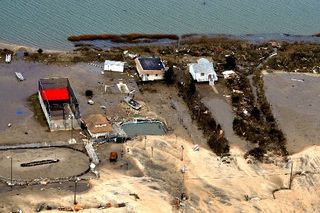POLL: Which Weather Event, Natural Disaster Would You Avoid if You Could?

This article was provided by AccuWeather.com.
Across the United States each year, numerous lives are lost and billions of dollars in damages are accrued as a result of weather and other natural disasters.
While not everyone has the economic means or the freedom from location-based responsibilities to move to an area that avoids their most-feared type of weather, some with the means to will choose to stay in a location less prone to the natural phenomena that they find most worrisome.
According to Dr. Ron Glassman, who specializes in the treatment of fear, phobia and anxiety, more than 25 percent of people suffer from a fear or phobia. About 1 percent of those have a fear focused on weather, typically associated with thunder or lightning.
With the U.S. averaging 1,300 tornado reports a year, six hurricanes annually and 25 million cloud-to-ground lightning strikes a year, there are many devastating types of weather.
Which natural disaster or weather event is most frightening to you?
Despite the fact that each region of the United States is regularly exposed to severe weather or natural disasters, and the chance that an atypical weather event can occur outside of where it usually happens, some people are quick to blame the victims of natural disasters for the losses they endure.
Sign up for the Live Science daily newsletter now
Get the world’s most fascinating discoveries delivered straight to your inbox.
According to Dr. Rich Carlson, associate head professor of psychology at the Pennsylvania State University, this may be partly contributed to Fundamental Attribution Error. It is a coping mechanism people may default to when they are afraid.
"People can look at what happens to themselves and know all the factors that lead to it," he said. "But they don't know some details for what may have impacted other people. They end up looking at another's situation and filter it through their own experiences instead and judge accordingly."
RELATED Weather Fears Lead to Fascinations Science and Psychology: Why People Ignore Tornado Warnings What Is Causing an Increase in High-Rated Tornadoes?
Essentially, it is a way for people to comfort themselves when they consider frightening situations. If they can say that there was a human fault that caused someone to be a victim, than they may be able to assure themselves that they won't be a victim because they did not or would make that decision. In the example of living in a severe weather location, the "decision" is to live in that particular area.
Similarly, Carlson explains how the Just World View may explain this mentality.
"People may protect themselves by trying to feel in control," he said.
For those thinking through the lens of the Just World View, in order to feel in control, they believe that the world needs to be just, that things happen for a reason and not at random. If tragedies happen at random than they cannot be controlled, and that thought is frightening to many people. In a Just World View, people may try to justify bad things by convincing themselves that victims are to blame for what happens, so that they may then "play by the rules" and stay safe from a similar occurrence.
Carlson stated that people with more fear towards a specific event may be more likely to look for a human error to blame when the event happens. A person who finds tornadoes to be the most frightening kind of weather, for example, may be more likely to say that a tornado victim had it coming for living in central Oklahoma. Likewise, the Oklahoma resident who most fears hurricanes may blame the New Jersey residents who lost their homes to Superstorm Sandy for living too close to the coast.
Read more on the psychology of fear and the avoidance of severe weather: Can Severe Weather Ever Be Avoided?
AccuWeather.com. All rights reserved. More from AccuWeather.com.
